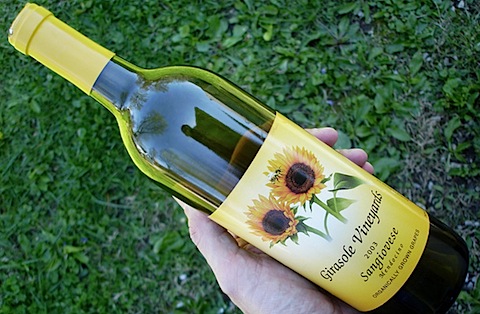Stereotypes about non-profit and for-profit firms explain why organic wine can’t command higher prices.
Today’s Freakonomics column picks up on UCLA research reported earlier this week by Matt McDermot at Treehugger.com.

The researchers, Magali Delmas and Laura E. Grant, demonstrated that organic wine cannot command as high a price as conventional (non-organic) wine. This despite the fact that these organic wines get higher ratings than conventional wines from Wine Spectator magazine.
The researchers suggest, and Freakomics reports, that this lower price is due to lingering memories of “hippie wine”, first generation organic wine made by… hippies.
But it’s not old memories of ‘hippie wine’ that cast doubt on the quality of organic wine. Instead, it is the extra ‘purpose’ of these organic vineyards that leads customers to stereotype the vineyards as well-meaning but less competent, and their organic wine as not quite up to sniff.
The real reason organic wine can’t get a higher price
Here’s my hypothesis:
Customers don’t think that vineyards that produce organic wine are as competent as typical vineyards, because organic vineyards are more like for-purpose businesses than for-profit businesses.
Consider that customers stereotype organizations based on their categorical identities. We expect commercial banks to act one way, investment banks to act another way, and hedge funds to act yet other ways. The type of organization leads us to expect types of behaviors and types of competencies.
That we expect different skill sets from different organizations due to their different types has been demonstrated time and again in corporate reputation research. Recently, marketing scholars have examined what customers expect from for-profit organizations and not-for-profit (aka for-purpose) organizations.
Non-Profits Are Seen as Warm and For-Profits as Competent: Firm Stereotypes Matter
Customers stereotype for-profit organizations as competent, and not-for-profit/ for-purpose organizations as warm. Competent organizations and warm organizations, while not exactly opposites, create two different kinds of products. Competent organizations create products that work, and warm organizations create products that are well-meaning.
Now, consider how organic wine producers and conventional wine producers might differ. Organic wineries have a social & ecological purpose in addition to their wine making & profit making goals. In contrast, for profit vineyards care only to make good wine and good profits.
Organize vineyards are more like for-purpose organizations, and for-profit vineyards are more like, well, for-profit organizations.
Perhaps customers stereotype the organic vineyards as being caring but not quite as competent as for-profit vineyards?
Consumers take product cues from the organization’s type
 Since buying an unfamiliar bottle of wine is a crapshoot, unless you are an oneophile or a fan of @GaryVee — you use your cues about the vineyard (and okay, whether there are animals on the label) to make your choice.
Since buying an unfamiliar bottle of wine is a crapshoot, unless you are an oneophile or a fan of @GaryVee — you use your cues about the vineyard (and okay, whether there are animals on the label) to make your choice.
If you are concerned about the quality of the wine relative to the price, you choose on perceived vineyard competency. Thus, you are willing to less for the organic wine, since it is probably more well-meaning than well-made.
What if it’s being ‘for purpose’ that gets in the way of selling at full prices?
See these related posts:
Can a for-profit business organization that also pursues a social purpose be authentic?
Honey is really bee vomit: Why we should label “NonProfit” Organizations “For-Purpose” Organizations
B Corporation Identity: An Opportunity for Organizational Authenticity
 I am an organizational consultant, change advocate, and organizational identity/reputation scholar with a PhD in leadership & organizations. I research, write about, and consult with organizations on the relationships between organizational identity, actions, and purpose. I teach Technology Management, part-time, at Stevens Institute of Technology.
My current research focuses on how social technologies in the workplace can drive organizational change, generate meaning, and catalyze purpose. See the
I am an organizational consultant, change advocate, and organizational identity/reputation scholar with a PhD in leadership & organizations. I research, write about, and consult with organizations on the relationships between organizational identity, actions, and purpose. I teach Technology Management, part-time, at Stevens Institute of Technology.
My current research focuses on how social technologies in the workplace can drive organizational change, generate meaning, and catalyze purpose. See the 
{ 2 comments }
Another reason organic wines may not be doing as well is that at least at the beginning, to have to organic label you could not at sulfites which (I think) act as a preservative to stabilize the wine and make sure it has good shelf life. So a lot of the wines really did taste bad (I know I tried a bunch of them early on!).
Now there are wines made with organic grapes that add sulfites, and I’m sure the industry overall is improving. I wasn’t aware of this gap though — interesting thoughts.
Hi Nancy-
The ‘no sulfite leads to vinegar’ problem was a real issue earlier on with organic wines, and though shelflife is improving w/ new lower sulfite stabilizers, customers (like you) do have lingering concerns…
I am guessing that there are many less knowledgeable wine customers for whom the stereotyping of vineyard types might matter– it’s an empirical question that would be fun to research. Especially since we’ve seen how much having a kangaroo or cat on the label tips people towards one unknown wine over other unknown wines.
What intrigues me most here is the question of whether/ how having avowed goals other than profit might influence how we imagine the organization’s competencies. It is a drag to imagine that having a purpose suggests an org is less competent…
cv
Comments on this entry are closed.